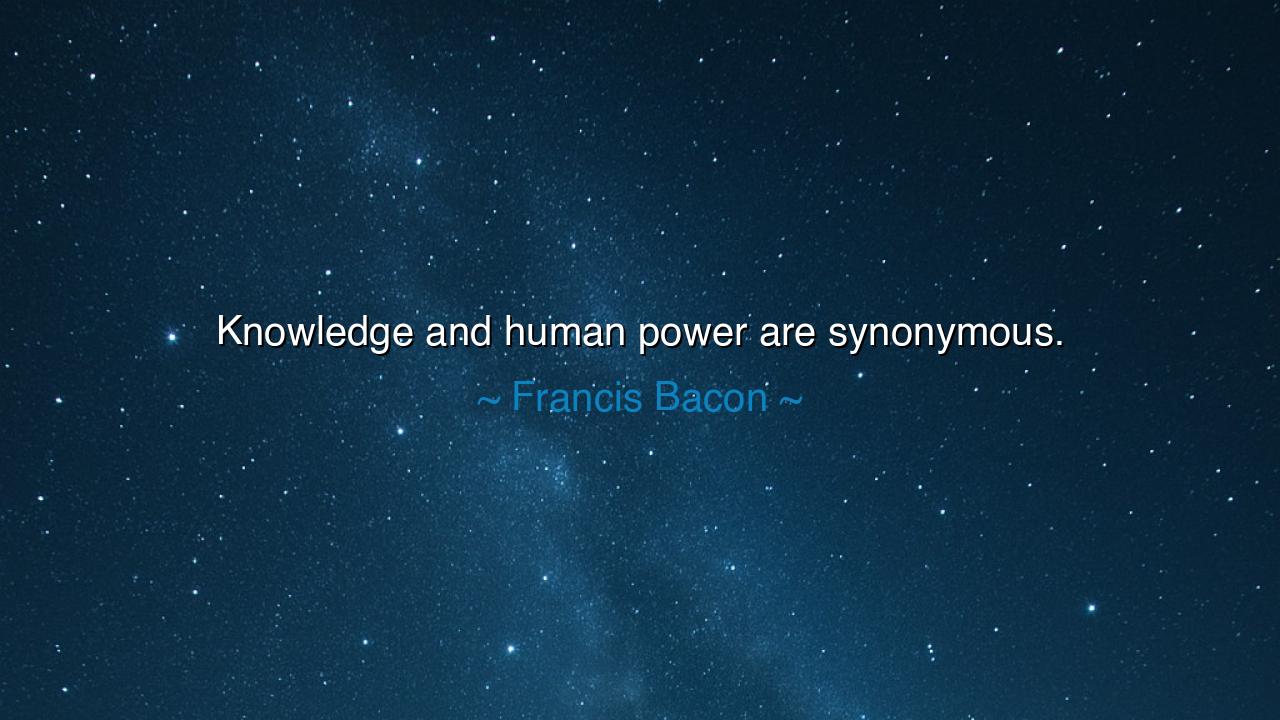
Knowledge and human power are synonymous.






The words of Francis Bacon—“Knowledge and human power are synonymous.”—thunder with the voice of one who sought to awaken humanity from the slumber of ignorance. Bacon, the great English philosopher of the seventeenth century, is remembered as the father of the scientific method, the one who taught that truth must be pursued through observation, experiment, and reason rather than superstition and blind tradition. His declaration is no idle phrase but a creed for civilization itself: that to acquire knowledge is to acquire power, and that the two cannot be divided, for they are as twin flames of the same torch.
To say that knowledge and power are one is to reveal that strength does not rest only in muscle, in armies, or in wealth, but in the mastery of truth. A farmer who knows the secrets of the seasons has power over the soil. A physician who knows the workings of the body has power over disease. An inventor who understands the laws of nature has power to shape the tools of tomorrow. Bacon’s insight is that human greatness flows not from blind force but from enlightened understanding. Knowledge is the seed, and power is its fruit.
This truth shines brightly in the annals of history. Consider the tale of Johannes Gutenberg, who in the fifteenth century harnessed the art of movable type. With his press, knowledge leapt from the hands of the few into the lives of the many. The Bible, once chained to cathedrals, now rested in the homes of common men. Ideas crossed borders, revolutions stirred, and empires trembled. Gutenberg did not wield a sword or an army—his weapon was knowledge, and through it he wielded a power greater than kings.
Yet Bacon’s words are not only triumphant—they are also cautionary. For power without wisdom becomes destruction. The same knowledge that split the atom gave humanity both the gift of energy and the terror of annihilation. Fire warms the hearth but can also raze cities. Thus, to say that knowledge is power is also to whisper a warning: he who seeks knowledge must wield it with responsibility, lest the power it brings consume him and all around him.
In Bacon’s own time, his vision of methodical learning laid the foundation for the Enlightenment and the scientific revolution. His insistence that inquiry be disciplined and systematic transformed alchemy into chemistry, astrology into astronomy, speculation into science. The world that once explained thunder as the wrath of gods came to understand it as electricity. Ships crossed oceans more safely, medicines cured diseases once fatal, and humanity began to bend nature to its service. Here was the fulfillment of Bacon’s creed: knowledge and power walking hand in hand, shaping the destiny of mankind.
The lesson, then, is clear: pursue knowledge as if your life depends upon it, for it does. Read, study, question, experiment. Do not be content with ignorance, for ignorance is weakness, and weakness breeds dependence. But as you grow in knowledge, temper it with humility and compassion, lest the power you gain become a tyrant rather than a servant. Let your knowledge be used not for vanity but for the lifting of others, for the healing of wounds, for the building of a future more just than the past.
So, O seeker of wisdom, carry Bacon’s words as a commandment: “Knowledge and human power are synonymous.” Let this truth be the fire in your mind. Seek knowledge not as ornament, but as strength. Use it to master yourself, to uplift your community, to guard your world. For in knowledge lies the power to enslave or to liberate, to destroy or to create. The choice is yours. Choose, then, to wield knowledge as the ancients wielded the sword—with honor, with courage, and with purpose. In this way, your power will endure, not in fleeting conquest, but in the eternal triumph of truth.






AAdministratorAdministrator
Welcome, honored guests. Please leave a comment, we will respond soon